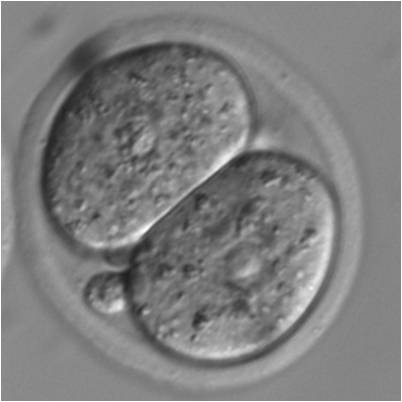
Mouse 2-cell embryo Photo: Miranda Bernhardt
The options available to couples facing infertility are increasing, whether or not a cancer diagnosis is involved. Assisted reproductive technologies (ARTs), such as in vitro fertilization (IVF), are becoming more and more common, and millions of healthy babies have been born with their help. With all this success, we might start to forget about the biology of it all–that the “in vitro” part of IVF litterally means “in glass”–IVF embryos go through fertilization and the first few days of embryonic development outside of their mother’s body. We need to make sure we consider the effects that growing an embryo outside the body for a few days might have.
An article from the New York Times, “Picture Emerging on Genetic Risk of IVF,” highlights recent studies looking at the impact of IVF. These studies have shown slight increases in the rates of certain birth defects and specific rare diseases related to abnormal gene expression in children that were conceived using IVF. (The changes in gene expression in these disorders are caused by problems in a process called ‘imprinting,’ which has to do with clusters of genes expressed differently based on whether they came from your mother or father.) Research using mouse embryos grown under different conditions also shows that there are differences in the behavior of adult mice produced from these embryos. It looks the very early experience of an embryo matters, but the reasons why are just beginning to emerge.
I think the most important impact of research like this is that it helps us realize that we have more work to do. It’s important to keep in mind that these disorders are still very rare in babies conceived using assisted reproduction, but it’s starting to look like the risk is slightly higher than in the general population, so it’s definitely something we need to think about and research. For the health of future generations, we want to make sure assisted reproductive techniques (ARTs) are as safe as possible.

